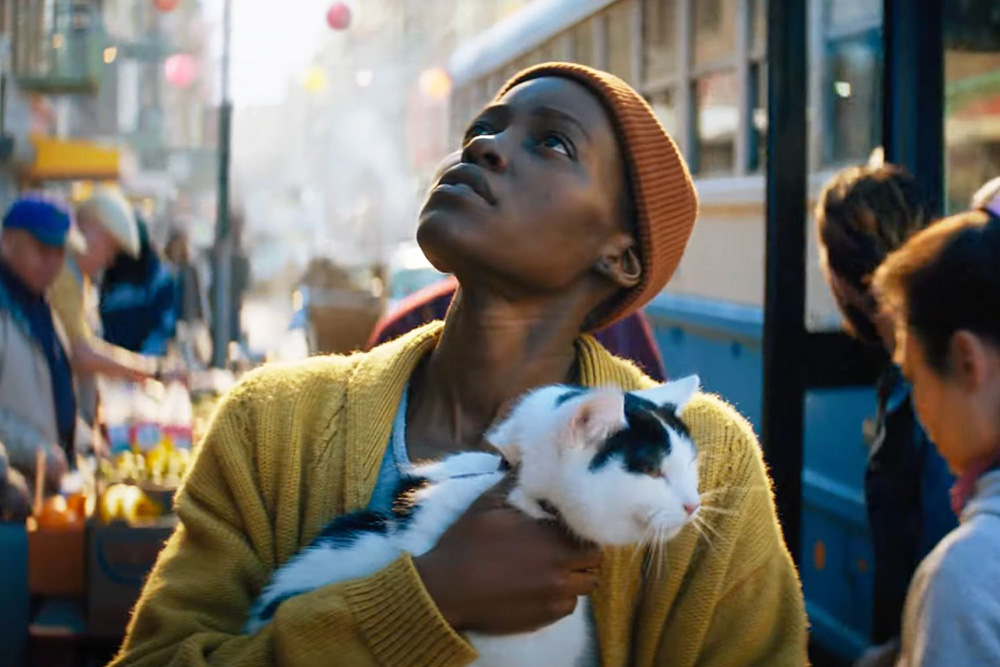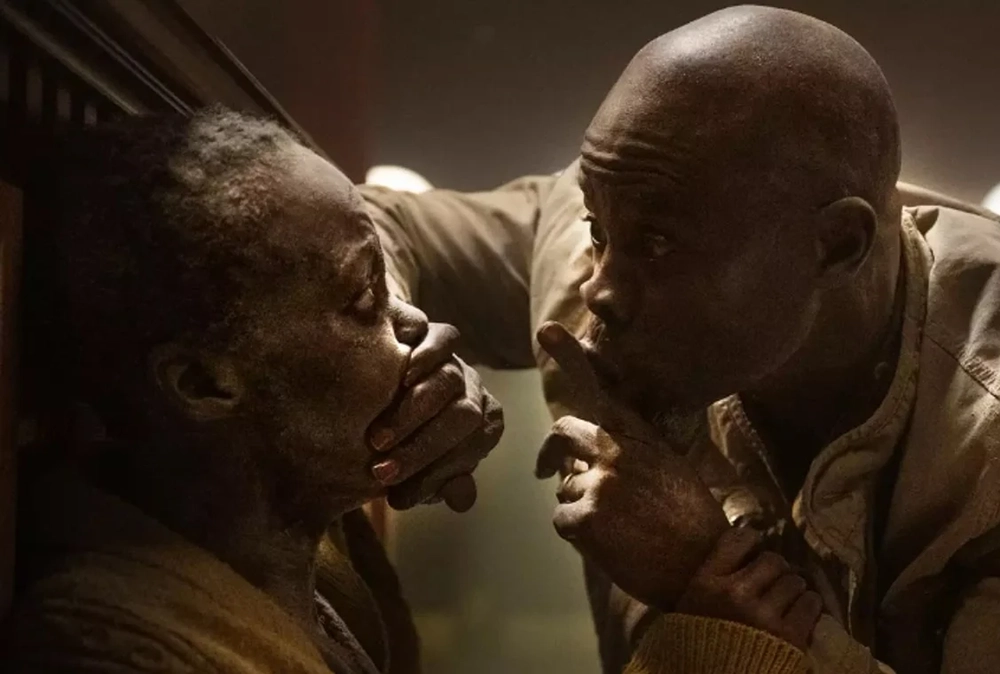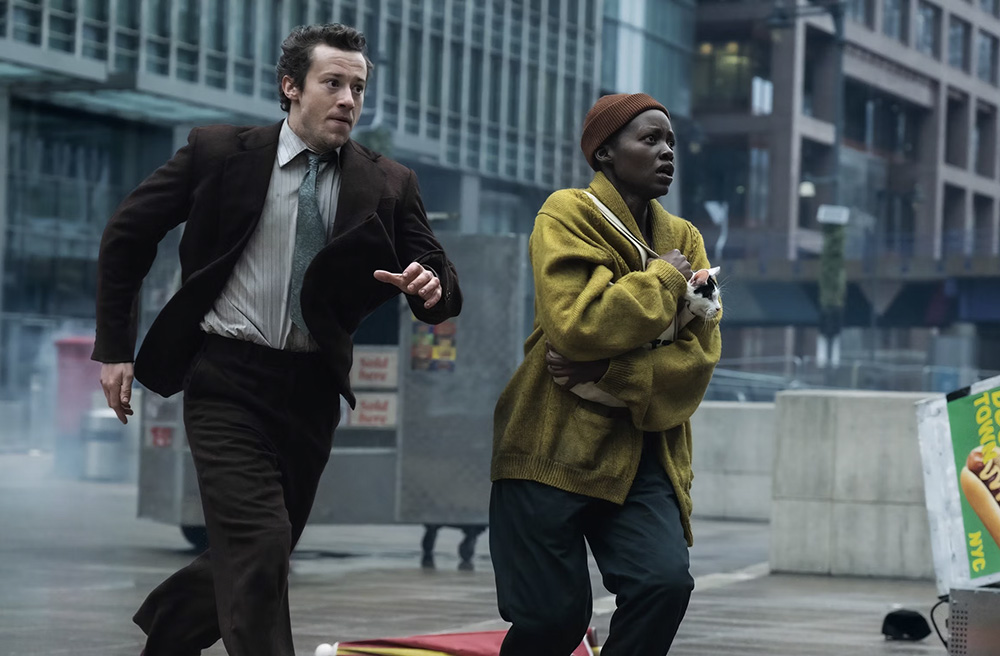“A Quiet Place: Day One.” And another case in point for not watching movie trailers. Or rather having your expectations subverted by them. Seeing the trailer for this film months back, I was excited. The stage was set in New York City as the hearing-sensitive super aliens attacked. The quick shots seen onscreen—including venerable Djimon Hounsou—hinted at massive structural damage, people running, and my first thoughts were of 2008’s “Cloverfield.” And while a departure from John Krasinski’s intimate and nearly perfect “A Quiet Place,” I was intrigued at a hard-action “Day One.”
However, sitting down to the film, one finds another emotional and close-knit film that fits into the “Quiet Place” universe. It opens somberly—in a hospice of all places—introducing Sam (Lupito Nyong’o), a young woman confronting the final stages of cancer. She takes a bus trip to New York City with her nurse (a great Alex Wolff) and other residents to see a show and get some pizza. We get the impression it’s been a while since she enjoyed herself in any fashion. Yet, it seems not to be. During the theater performance, the group is rushed out to return to their hospice center amidst talk of “something happening in the city.” This ‘something’ are the aliens from “A Quiet Place” first landing. Suffice to say, the bus never makes it back and Sam is thrust into a battle for survival.
Not the Blockbuster Action Trailers Promised
“Day One’s” departure from its trailer might irritate theatergoers expecting more action and destruction. Its filming location may have something to do with it. The film takes place in NYC yet is filmed in London, and Cinematographer Pat Scola may have wanted to hide its obviousness by confining the film to dark building interiors and quick skyline shots. The film drags a bit until the 30-minute mark. But then it introduces a young man, Eric (Joseph Quinn). He’s literally brought to Nyong’o’s Sam by her cat, Frodo (played by two felines, Nico and Schnitzel—Director Michael Sarnoski insisted on a real cat, shunning CGI). The three of them create a bond that’s sweet and delicate amidst the chaos. Eric is a panic-stricken young man far away from his family in the UK. And while Sam is a stronger character, they both provide assistance to the other in touching ways.
The budget for Sarnoski’s film is $67M, and there are a number of shots of apocalyptic streets and structural damage. However, special effects don’t seem the aim of this film, but the story. One early scene is harrowing though: the military destroys the bridges leading in and out of Manhattan, stranding the people. There is hope though: a boat in the harbor near the South Street Seaport, which fleeing survivors can make way for (the movie is pretty quick to point out the creatures can’t swim, a departure from the aforementioned “Cloverfield” where the monster can basically go wherever it wants).

Of criticisms, there are a few. Most notable is Sarnoski and co-writers John Krasinski and Bryan Woods’ assumption that audience members have seen parts 1 and 2. Within moments of the alien attack, Hounsou’s Henri is clapping hands over talking mouths and warning people to stay quiet. How did they figure out in mere hours that noise attracts the creatures? This is day one after all. The decision to not show much carnage or chaos also makes the film feel more closed off and less tense. During the film’s opening, it feels as though Sarnoski and team are feeling things out, trying to see what works.
Krasinski and Sarnoski Bring an Emotional Edge
Yet, once Sam and Eric meet, “Day One” transitions into tenseness and gravity as they try to survive. Sarnoski and the writers ask us to step into Sam’s shoes and experience the disaster with her. Would a cancer patient in the last stage of her life try to survive the end of the world? It’s a fair question. And it’s not really nonsensical that all she really wants to do is make it back to Harlem for one last slice of real pizza. We learn things about her along the way, and the best part of Nyong’o’s acting is the way she is earnestly funny yet caring. Seeing the bond between her and her cat is even more touching learning of Nyong’o’s fear of cats prior to filming.
Alongside her, Joseph Quinn does a good job as a fish out of water. And the way he refuses to take off his suit and tie (he’s a law student, and we get the impression due to family pressure) until the film’s dying frames hints at his inability to really address the situation. But his scenes with Sam are touching and real. The film’s best is inside a jazz club in a scene that has the nuance and vibe of a populated, musically-alive venue even though its abandoned and half-destroyed. Sam learns to live again from their time together. And through clever writing, there is no love angle between Eric and Sam; and Sam is the one who saves him, not the other way around. Both play their roles well. And the film’s ending—though heartwarming and tender—avoids sadness in light of hope.
Nyong’o and Quinn Present Endearing Characters

Knowing that Krasinski was again instrumental in the writing process, it’s no surprise “A Quiet Place: Day One” shies away from the destructive and instead concerns itself with personal connections. Could it have been more violent? Probably. But that wouldn’t have served the film. We’ve already seen the aliens and what they’re capable of. Maybe this story—of Sam confronting mortality before the aliens even land, and Eric fumbling to do the right thing—is what “Day One” needed. There were many chances for overdone movie tropes in the film’s 1 hour and 40 minutes. Perhaps “A Quiet Place: Day One’s” greatest achievement is its restraint. If nothing else, it fits into the universe well. It also paves the way for a likely fourth installment—hinted at via IMDb—down the line.
“A Quiet Place: Day One” is available to watch in theaters.



